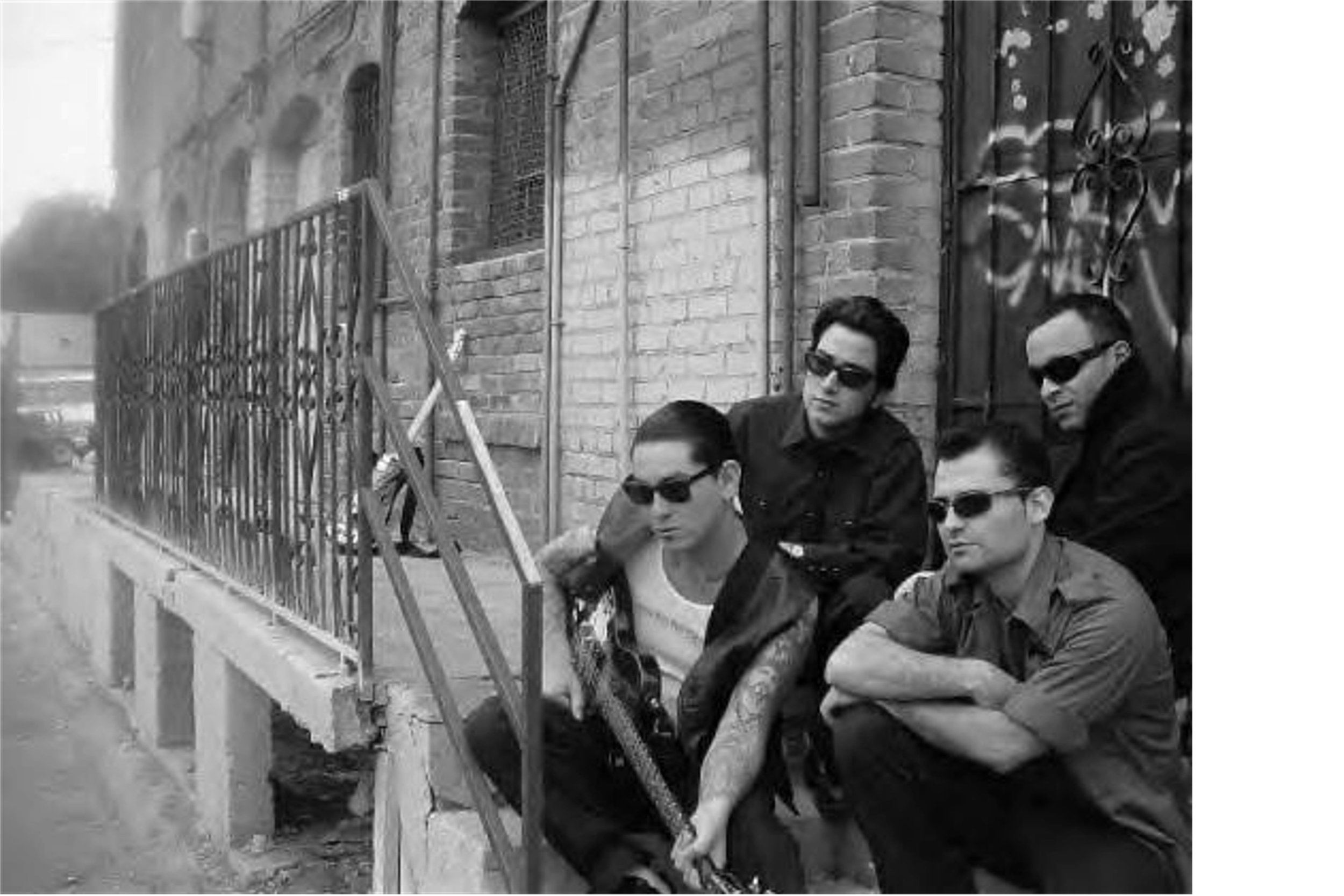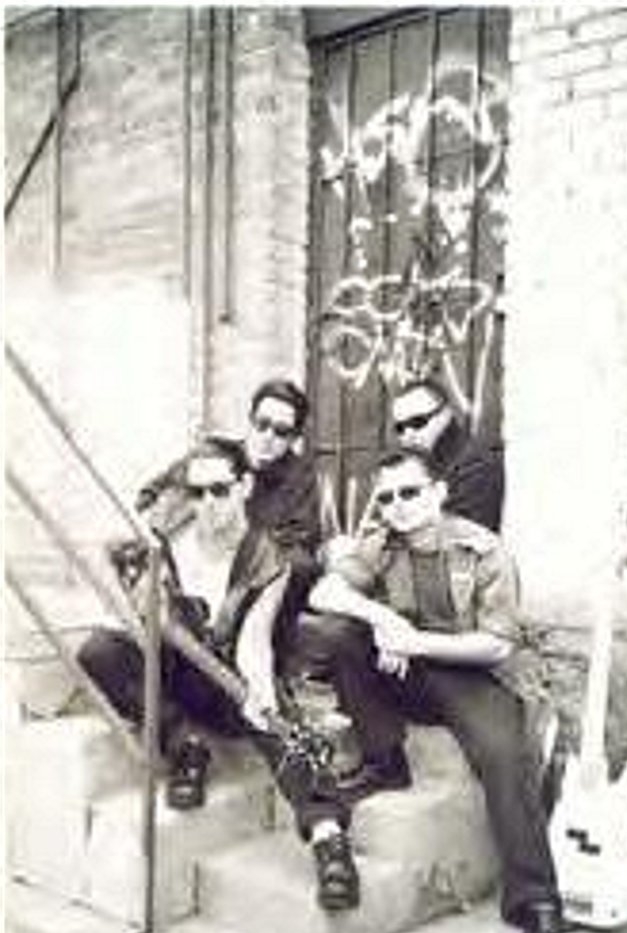Courtesy of Deadbeat Sinatra
Courtesy of Deadbeat Sinatra
Courtesy of Deadbeat Sinatra
Dig That Sound
Interview With Deadbeat Sinatra
Los Angeles
From Issue 1.3, January/February 2005
At every every stage in the progression of music, there have probably been points in time where music fans were left wondering, ‘is this it? Is this what music has become?’
That point would be right about now.
Never before has the need for bands like Deadbeat Sinatra, been so dire.
Not to put this band on a monstrous pedestal of any sort, but Los Angeles band, Deadbeat Sinatra (thankfully so) plays some good, quality music.
They seem to have updated that classic rocker sound mixed with a little bit of glamour (minus the kind of frills that would make them another trendy band groveling for their 15 minutes of fame).
An important point to make before writing any further, is to say the music and the members of Deadbeat Sinatra are far from being
deadbeats or dull. Jaded as it is to label a band’s sound refreshing, there is something uniquely distinct about this trio’s sound in that it is the kind of music that rarely ever gets played on mainstream radio stations. It is the kind of music that someone would be busting out of New York city clubs in the 70s.
The voice of Deadbeat Sinatra’s front man, Adrian Misquez, has that iconic sort of raspy, sandpaper-ness that is the epitome of cool without trying very hard. Think Mike Ness of Social Distortion, mixed with that pop quality music the Ramones refined.
The band consists of original members Misquez doing guitar and vocals, David Perez playing bass and Larry Ayon on drums.
“We weren’t hearing the music we wanted to hear. All the L.A. bands have disappeared such as Motorcycle Boy and Terror Train. So, we decided to do something different,” said Misquez of the reasons for starting Deadbeat Sinatra.
Their distinction relies on how Deadbeat Sinatra music has that pop appeal overshadowed by lyrics about being heartbroken or dancing-nothing too serious and nothing too lame.
Their sound has catchy guitar and bass riffs mixed with snappy drum beats that are characterized with something that goes against the grain of all that is trendy in music today.
They are much more classic rockers, then a flashy, passing fad. A lot of this has to do with how they are influenced by various styles of music rather than sticking to only one format.
“We have a lot of influences-from 50s rock ‘n’ roll, to 60s mod and glam and 70s punk and new wave,” said Misquez.
These influences come from a variety of musical backgrounds. Prior to starting Deadbeat Sinatra, Misquez played in the punk band Sin Alley for five years. Perez fomerly played in a rude boy band and Ayon was a new wave drummer in the 90s. All of these backgrounds come together in the sound displayed on a CD split with the Put-Ons (another equally talented band), which was put out by La Habra based label, Basement Records.
The split features songs such as “Baby Doll” (which appeared in a recently released movie, Take Out) and “Do the Monster” (which the band hopes to have appear in a soda commercial). The band also sang a cover of the Ramones song, “Chinese Rock” on the split.
“Lyrics are like my poems put into music. We usually sing about girls, being heartbroken, dancin’, sex and violence. I believe that lyrics do mean something; they’re like poetry,” said Misquez who writes the lyrics.
Despite their clean sound on the split CD, the Deadbeats’ intentions to make a new kind of sound, did not necessarily come with ease. The reasoning behind their band name plays a lot in explaining what they were like when they first started as a band four years ago.
“I originally wanted the band to be called Ruthless Sinatra. Larry wanted to be called the Deadbeats. So, we just decided to call the band Deadbeat Sinatra. At the time, it was a very appropriate name. We were creating our new sound and at the time, it was a disaster (a musical deadbeat). I’m a big Frank Sinatra fan, and I couldn’t sing,” said Misquez explaining how the band started out and where it got its name. “Just think of Sid Vicious, My Way. So, we just kept the name Deadbeat Sinatra because it just sounded cool.”
The band recently played at the Kiss or Kill club in Los Angeles and plans to put out an album, “Shake ‘n’ Bones.” However, they are waiting to see if a label will back them.
Practicing two to three times every week, Misquez described a typical practice as, “fun, hard work and very frusterating. Sometimes we get on each others’ nerves, but we seem to work things out.”
And lucky for fans of good music, they do work things out, just as they managed to work things out in their somewhat rocky start to becoming the band cleverly named Deadbeat Sinatra (which is now ironic once someone listens to their CD or their live shows).
Updated Sinatras? Maybe.
Deadbeat music? Definitely not.
Perhaps Misquez summed it all up best when he commented, “Well, if you’re tired of the same old shit, come check us out baby!”
So, go check them out!



